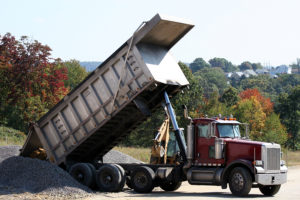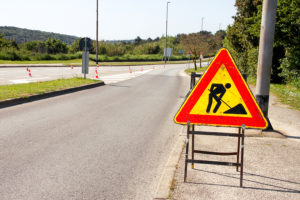 A Philadelphia judge recently dismissed charges against a garbage truck driver who allegedly struck and killed a 24-year-old woman as she was bicycling to work. The 28-year-old driver was arrested a year after the accident and charged with vehicular homicide after the District Attorneys’ Office discovered that the driver was driving with headphones on, which is illegal in Pennsylvania. The driver was reportedly looking down at paperwork in the center console when he turned right from the street’s left turn lane and cut into the young woman’s path. However, the driver’s truck accident attorney argued that the man was only wearing one earbud while driving and that he had not violated the city’s traffic laws.
A Philadelphia judge recently dismissed charges against a garbage truck driver who allegedly struck and killed a 24-year-old woman as she was bicycling to work. The 28-year-old driver was arrested a year after the accident and charged with vehicular homicide after the District Attorneys’ Office discovered that the driver was driving with headphones on, which is illegal in Pennsylvania. The driver was reportedly looking down at paperwork in the center console when he turned right from the street’s left turn lane and cut into the young woman’s path. However, the driver’s truck accident attorney argued that the man was only wearing one earbud while driving and that he had not violated the city’s traffic laws.
Later, the family of the young woman reached a $6 million wrongful death settlement with Gold Metal Environment, which owns the trash truck that the driver was operating. Additionally, the company agreed to give $125,000 over the next five years to organizations that are attempting to make Philadelphia’s streets safer.
While the case is unfortunate, it is hardly an isolated incident. Philadelphia’s sanitation fleet had been in about 2,000 accidents in recent years. Two-thirds of those accidents were determined to have been the fault of the trash truck driver, and the accidents have resulted in dozens of personal injury claims. Settlement of those claims has cost the city’s taxpayers around $4.8 million during the past five years.
While much has been made about the accident rate of garbage truck drivers in New York City, Philadelphia’s municipal trash truck drivers actually have a higher accident rate, with an average of one accident for every 3,800 miles driven compared to one accident in every 6,300 miles for New York City drivers.
In the meantime, dump trucks are also a known contributor to traffic accidents. A dump truck crushed an SUV in Chester County, killing two people inside and wounding three more. The two vehicles collided on the ramp between southbound U.S. Route 202 and westbound U.S. Route 30. Emergency crews worked to rescue the five people who were in the Nissan Pathfinder that was crushed beneath the truck. Two of those people were already dead, and three others were injured, including two who had sustained critical injuries. The dump truck driver was uninjured.
If you’ve been injured in an accident involving a dump truck or a garbage truck in Philadelphia, you should seek compensation to pay for your expenses. An experienced accident attorney can help you make sense of the process.
The Dangers of Dump Trucks and Garbage Trucks
Dump trucks and garbage trucks are two necessary components of our everyday lives. Garbage trucks are responsible for collecting solid waste from homes and businesses throughout Philadelphia. Dump trucks carry materials, such as rocks and dirt, to construction sites around the region. However, in spite of their importance to society, each of these types of trucks poses specific hazards to other motorists on the roadway, as well as to bicyclists and pedestrians.
The Problem With Dump Trucks

Dump trucks have inherent issues that make them unstable in certain conditions, such as rounding a sharp curve. Heavy loads of loose material carried in the back of the truck can shift during transport, creating a serious weight imbalance in the vehicle. The weight imbalance may make it hard to control the large vehicle—which already requires additional effort to maneuver simply due to its size—and can also cause it to overturn. Even when the truck is not traveling at a high speed, or is perhaps not even moving at all, the imbalanced load can cause the truck to tip if it is on an uneven surface.
When the dump truck empties its load, the loose material can sometimes “stick” to one side of the bed. This can result in a dangerous situation for others at the construction site or for other motorists who may be traveling along the roadway through the work zone. The higher center of gravity present in dump trucks and other large trucks further increases their risk of rolling over.
The Problem With Garbage Trucks
The president of the union that represents 1,200 Philadelphia sanitation workers stated that the overwhelming number of garbage truck accidents isn’t all the fault of the employees, in spite of the data to suggest otherwise. The maze of narrow streets throughout the city, littered with parked vehicles that drivers must maneuver around, adds to the problem, he said. Additionally, garbage truck drivers are told to squeeze 10 tons of trash into a truck that was only designed to hold eight. Overloading the vehicles damages their brakes, according to the union president.
Another problem, according to the news report, is that the city has failed to enforce its own policies regarding sanitation workers who are involved in accidents. Streets Department rules state that drivers with two accidents in a month or four within a year are subject to demotion or firing. However, under the policy, 72 of the city’s 500 garbage truck drivers should have been fired or demoted since 2015 but have not been. One trash truck driver had 19 accidents from 2015 to 2019. He was liable for eight of those accidents.
Why so Many Accidents?

Similar reasons cause accidents involving dump trucks and garbage trucks, although some causes are specific to each truck type.
Similar reasons include:
- Size. Large trucks require more distance to stop, more space to turn, and can be difficult to maneuver.
- Speeding. As the pace of society gets faster and focus on a company’s bottom line gets sharper, drivers find themselves being rushed to complete their work. When driving a dump truck or a garbage truck, this may mean driving too fast, determined based on the vehicle’s size and the conditions of the road.
- Improper maintenance. Heavy loads place an incredible burden on a vehicle’s systems, including its braking system and its tires. Each of these vehicles is required to have regular maintenance. However, if that maintenance is not performed or not performed properly, it places the drivers at risk along with everyone else on the roadway.
- Large blind spots. Like other types of large trucks, dump trucks and trash trucks each have significant blind spots on all four sides, creating the potential of an accident with a smaller vehicle as the driver attempts to change lanes, back up, or complete a turn.
- Distractions. Drivers of dump trucks and trash trucks aren’t simply driving. They’re also dealing with other work-related tasks, such as paperwork, communications with their dispatchers, and communications with other employees. Unfortunately, each of these additional tasks draws the driver’s attention away from the task of driving, just as other commonly-discussed distractions that all drivers face, such as texting, eating, or visiting with passengers.
- Improperly trained drivers. The operation of dump trucks or garbage trucks, particularly in the real world of various road conditions and types of traffic, requires a significant amount of training to complete the job safely. However, companies and government entities often find themselves short-staffed, leading to drivers who haven’t received the full extent of training needed before starting work.
Dump Truck Accidents:
- Work zones. Dump trucks don’t merely travel on the roadways, but rather in and out of work zones. Work zones are, by their very nature, a place where accidents frequently happen due to the constant changes in speed and lane alignment in the zone, as well as confusion and distraction of other drivers and the activity of construction vehicles and workers. In Pennsylvania in 2018, there were 1,659 work zone crashes, resulting in 23 fatalities and 1,110 injuries.
Garbage Truck Accidents:
- Generally, garbage trucks are most active in the early morning hours, perhaps to save time that would otherwise be spent sitting in traffic. Unfortunately, however, this means that they’re out around the same time as people are leaving for work or school, creating dangers for bicyclists, pedestrians, and other vehicles on the road.
Staying Safe Around Large Trucks
It is impossible to avoid any type of commercial vehicle collision. However, there are some things you can do to resist your risk of being involved in an accident with a dump truck, garbage truck, or other large truck.
- Avoid the no zone. No zones are the area of a truck where the driver is unable to see you in his or her side mirrors. These are often known as blind spots. A tip for avoiding driving in a truck’s blind spot is to look for the driver’s reflection in his or her side mirror. If you are unable to see the driver, then chances are, he or she can’t see you either.
- Avoid distractions. Realize that distractions are a deadly problem in all types of traffic and involving all types of vehicles. However, dump trucks, particularly those near a work zone, have a high likelihood of stopping, backing up, or pulling out in front of you. Garbage trucks may also come to a sudden stop, drive on the wrong side of the road, or drive down the middle of the road. Motorists must focus solely on the task of driving when traveling around these vehicles.
- Don’t follow too closely. As described above, these types of trucks are both known for making sudden stops. Due to the high center of gravity on large trucks, this places you in the extreme danger of becoming trapped underneath the vehicle, which is a catastrophic event known as an underride.
- Always use caution when walking or riding your bike near a garbage truck, with the realization that the driver may make a sudden and unexpected turn and that he or she may not be expecting you to be there and may not be able to see you at all. Be mindful of the back up warning that most of these vehicles have when backing up. Be sure you’re aware of where the sound is coming from and stay out of the truck’s path. Also be aware, however, that these warning systems sometimes malfunction and do not emit a sound as the driver reverses.
Liability in Garbage Truck or Dump Truck Accidents
If you’ve been injured in an accident that was caused by the driver of a garbage truck or dump truck, you may be able to receive compensation for your injuries through a third-party insurance claim with the insurance carrier of the company that employs the truck driver or through a personal injury lawsuit. In addition to the truck driver, there may be additional liable parties, including:
- The company that employs the driver, or—in the case of a sanitation worker employed by Philadelphia—the city itself. The reason employers may face liability in accidents that their employees cause is because the driver was acting as a representative of his or her employer at the time of the accident. Additionally, the employer is responsible for doing a background check, including a driving history for the drivers it employs, and is also responsible for ensuring that the driver is properly trained to operate the truck safely. It almost goes without saying that if the sanitation workers’ employer is telling the drivers to overload their vehicles to the point that it causes the brakes to fail, that could also be a source of liability for the employer.
- The person or entity responsible for maintenance of the truck, if that maintenance was performed improperly or dangerous issues were missed.
- The manufacturer or distributor of defective parts that may have caused the accident, such as the manufacturer of a malfunctioning backup warning system.
- Governmental entities, if a factor in the accident was a poorly maintained roadway or a dangerous intersection that doesn’t have the proper signage.
- The driver of another vehicle, if that driver’s negligence also contributed to the accident.
If you were injured in a garbage truck or dump truck accident in Philadelphia, speak to a truck accident attorney as quickly as you can, as you will face strict time limits to filing your truck accident claim.